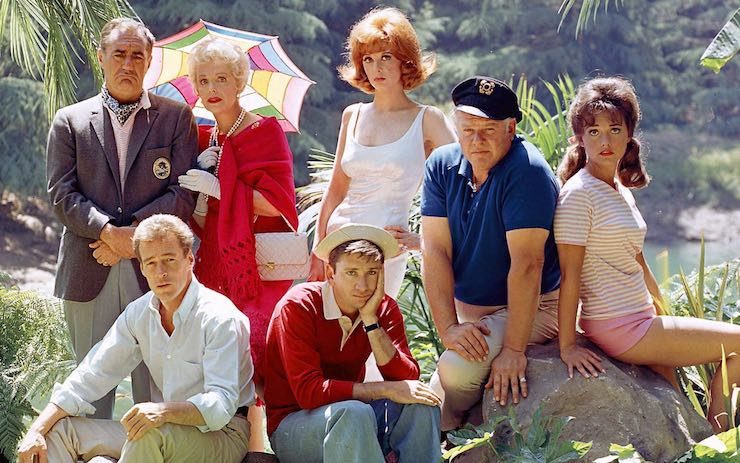The Seven Deadly Sins have been part of Christian theology since at least the 6th Century, and authors have been borrowing and reinventing them ever since—Dante largely ordered his vision of Hell and Purgatory around the sins, and Chaucer’s Canterbury Tales contains a lengthy treatise on ways to remedy them. Many modern authors and screenwriters, too, have had their fun with with the sins, especially with casts of characters meant to represent specific sins themselves. Whether giving audiences a fascinating insight into human nature or providing reliable antagonism, writers have mined this crew for centuries.
The Sin du Jour Affairs by Matt Wallace
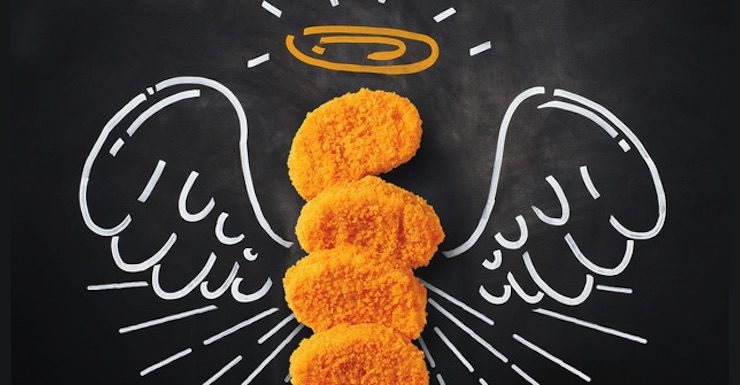
Matt Wallace’s series of novellas feature chef pals Darren and Lena, two new members of the staff at Sin du Jour Catering & Events. But until their first day on the job, the two were unaware that Sin du Jour’s specializes in meals fit for a supernatural clientele, demons included. Whether its tracking down exotic ingredients (like angel-meat) or dealing with the chaos of a Goblin wedding, Lena and Darren roll with the punches of their new jobs—after all, they’re professionals, right? As the series progresses, the caterers are drawn deeper into the supernatural world bubbling beneath our own—they’ve come a long from from Envy of Angels to the explosive conclusion in Taste of Wrath…
Bedazzled (1967)
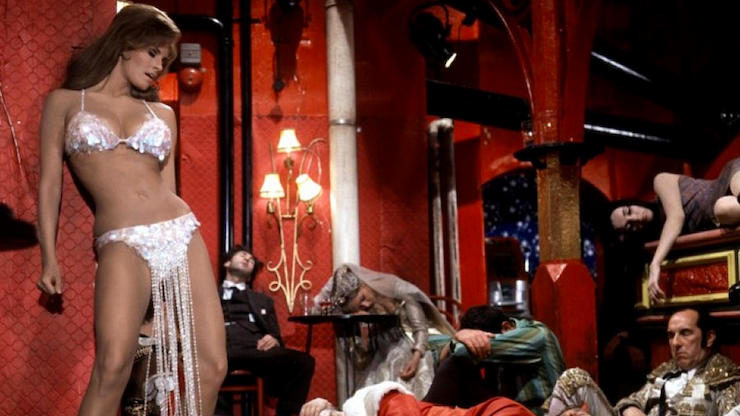
Though younger fans likely only remember the remake with Brendan Fraser and Elizabeth Hurley, the original Bedazzled starred the incomparable duo of Dudley Moore and Peter Cook as Stanley Moon and Satan (who goes by the name George Spiggott). Throughout the film, Stanley comes into contact with embodiments of the seven deadly sins—most notably Lust (above) and Greed—who work for the Devil and carry out acts of vandalism and so on. Though they are only tangental to the plot—where Moon agrees to sell his soul to Spiggott for seven wishes in an effort to get a waitress named Margaret Spencer to fall in love with him—the motley group provide a good portion of the film’s laughs.
Keys to the Kingdom Series by Garth Nix
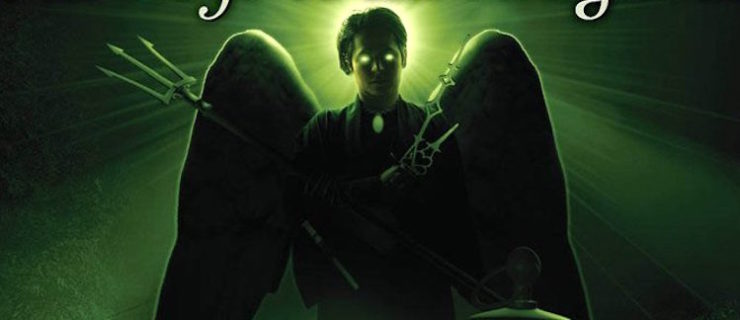
The Keys to the Kingdom series has a different villain for each book, and they’re all named after different days of the week! These books follow the doings of The House, which used to be under the power of “The Architect” who disappears. Despite the Architect’s Will dictating that the House should be run by a mortal from the Secondary Realms, the seven most powerful beings of The House decide to imprison the Will and keep the Keys to the Kingdom for themselves. The system stays in place for 10,000 years until one part of the Will escapes and tricks one of them into handing their key over to the Rightful Heir—Arthur Penhaligon. The boy realizes that he has to defeat this group and reclaim all of the keys in order to put the House to rights. Unsurprisingly, the trustee who hands over his key without thought is Monday, the embodiment of Sloth.
Gilligan’s Island
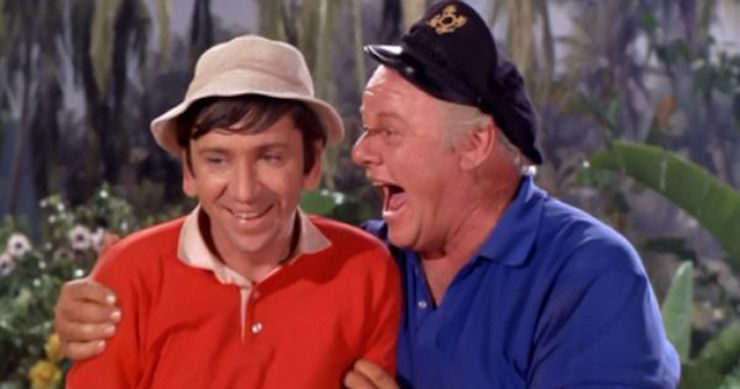
What is this doing here, you ask? Turns out, the show’s creator wrote a book called Inside Gilligan’s Island where he suggested that each of the castaways embodied a different sin. That seems an odd burden to saddle your shipwrecked central characters with, but it’s also a sharp way of ensuring conflict—if you’ve got someone who’s always Wrathful (Skipper) bouncing off of someone who’s always Slothful (Gilligan) you’re bound to come up with shenanigans. It probably helped a lot in sketching out scripts, just by keeping that as a constant reminder.
The Hannibal Lecter Series by Tom Harris

It has been said that each of the main figures in Harris’s series centered on Hannibal Lector and Clarice Starling represent one of the seven sins: Clarice and Hannibal themselves are Pride and Gluttony respectively. The other central antagonists of the series make up Envy (Jame Gumb), Lust (Francis Dolarhyde), and Wrath (Mason Verger). The detective Pazzi is said to be Greed (likely for agreeing to take the bounty on Hannibal for Verger), and Dr. Frederick Chilton becomes Sloth, using others to further his research while refusing to do the hard work himself. It is uncertain whether or not this was the interpretation that Harris intended, but the characters do seem to match up in a succinct manner.
Charmed — “Sin Francisco”
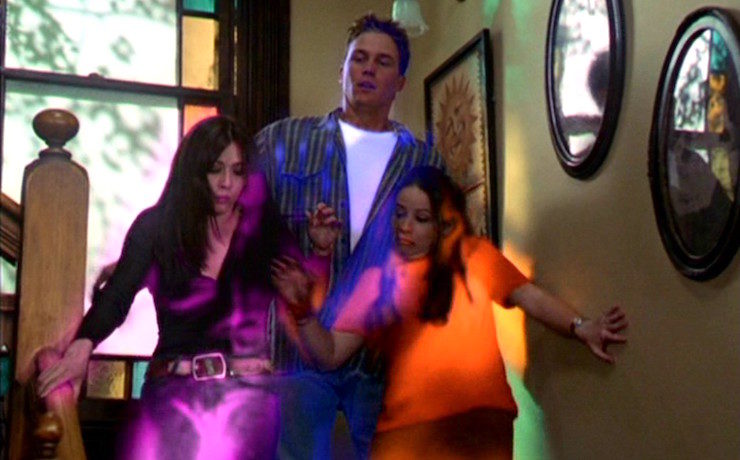
The show’s sister trio (and friends) got slammed with massive doses of sin… infections? That’s the easiest way of describing what happened when a demon came to town wielding very specific power. Leo got hit with Sloth while sisters Prue, Piper, and Phoebe got hit with Pride, Gluttony, and Lust respectively. Each person had to purge the sin by defying it, which on paper doesn’t seem all that clever. This episode wins points for putting an interesting spin on how the sin of “Pride” works, however; Prue couldn’t get rid of Pride so easily because doing so always turned into a show of how brave and selfless she was being—which is basically the embodiment of Pride.
Doctor Faustus by Christopher Marlowe
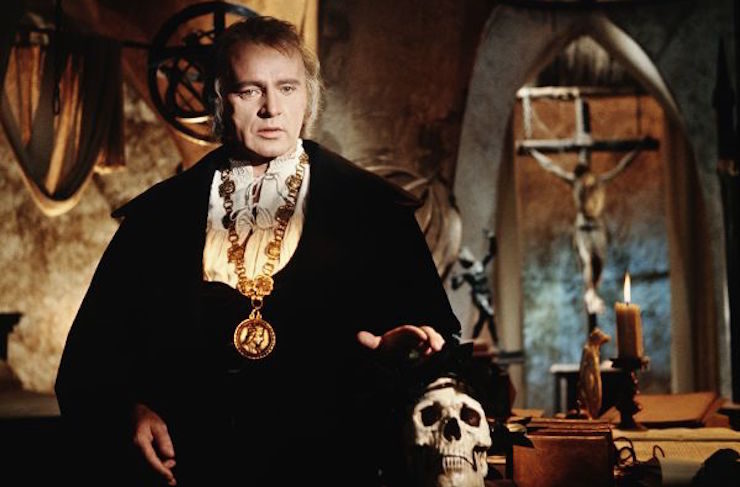
Christopher Marlowe’s The Tragical History of The Life and Death of Doctor Faustus features a parade of the Seven Deadly Sins. In this classic Elizabethan take on the story, Faustus sells his soul with the sensible goal of gaining knowledge forbidden to man. Mephistopheles, in a twist that Faust really should have seen coming, instead wastes his time, doesn’t teach him anything, and simply tries to tempt him with Earthly delights and distractions. Faustus spends the play whipsawing between repentance and gleeful sin, while a pair of angels goad him on. At one point he finally comes within a few heartfelt words of asking God to take him back, but Mephistopheles can’t let that stand, so he pops down to Hell and comes back with all Seven Sins in tow. They parade around Faust, who’s so excited to finally see some supernatural action that he misses the warning they represent.
They’re all pretty hilarious, but favorites go to Gluttony, who asks Faustus if he can stay for supper, and Sloth, who sighs, “I was begotten on a sunny bank, where I have lain ever since; and you have done me great injury to bring me from thence: let me be carried thither again by Gluttony and Lechery. I’ll not speak another word for a king’s ransom.” But naturally the best line goes to Lust (the only sin represented by a woman) who summarizes her Tinder profile for Faustus, saying, “I am one that loves an inch of raw mutton better than an ell of fried stockfish; and the first letter of my name begins with Lechery.”
There are plenty more examples, of course, from the obvious (Seven) to the not-so-obvious (Charlie and the Chocolate Factory, maybe?). Let us know your favorites in the comments!
Originally published in January 2017.










